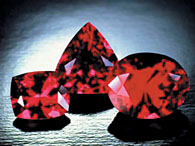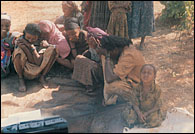The Surprising Career of Virginia Carter (Page 3)
The Surprising Career of Virginia Carter (Page 3) McGill University
User Tools (skip):
The Surprising Career of Virginia Carter (Page 3)
During her Hollywood years, Carter met David Poindexter, "a Methodist minister without a church, who didn't wear a clerical collar." Like Carter, Poindexter recognized the importance of television in bringing about social change. He saw how in Mexico popular TV "novelas" added content to shift values and attitudes. Poindexter formed a group focused on the problems of population growth in developing countries that became affiliated with the United Nations.
"That all fed into one of my main values, which is the status of women in the world, because if you educate women and give them access to health care and empower them, the birthrate drops like a rock," says Carter. She used her broadcasting expertise and her influence to become an effective part of the group, which today operates under the name Population Media Center, and of which David Poindexter is Honorary Chair.
The 1980s brought another drastic career change for Carter: Coca-Cola bought Lear's company and the shift in ideology was so unsettling, she says, that there was "nothing else for it" but to move on to a new venture. Carter's partner, Judith Osmer, a scientist she'd met at Aerospace Corporation, had developed a process for making synthetic rubies. Her company, J.O. Crystal, needed managing, so Carter became president to Osmer's CEO.
|
|
 Rubies from J.O.
Crystal, where Carter became president after leaving
Hollywood. Rubies from J.O.
Crystal, where Carter became president after leaving
Hollywood.PHOTO: J.O. Crystal |
|
|
|
She learned how to type and use a computer, deal with inventory control and the kind of activities that her secretary in Hollywood had always taken care of. "It was important to us to learn how to do everything ourselves." It also fell to Carter to take a course on website design. "It was me and a group of 20-year-olds," she says wryly. "It was difficult, but I managed to learn how to do it."
After the stresses of Hollywood, ruby production had its charms. Being "knee deep in these wonderful stones" is one of the pleasures Carter still derives from the business. The crowning moment for the company was when the Smithsonian Institution approached Osmer and asked for some of the rubies for display. Today the rubies can be seen in the same exhibition hall room as the Hope Diamond.
Our diligent waiter hovers but we decline more tea. Carter mentions that she's considering retirement from J.O. Crystal in a year or so. "Sixteen years of trade shows take their toll," she explains. "I want to do other things."
Two activities for which she has an enduring passion are fishing and her work with the Population Media Center. Carter was in Ethiopia earlier this year, helping to train writers to create radio dramas that will assist in the fight against AIDS. While most of the news coming out of Africa via the recent AIDS conference in Barcelona is grim, the Center reports an astonishing success rate in all areas of its mission.
Radio listeners were monitored in selected regions of Tanzania to see if the soap operas were changing people's understanding of the risks associated with HIV/AIDS. The radio audience was so affected by the outcome of some of the dramas that their views and behaviours underwent an evolution that can only be described as remarkable. One almost immediate change was a 150% increase in the use of condoms in the area surveyed. Positive results directly attributable to the broadcasts have also been noted in Mexico, India and China. Another PMC initiative is to raise funds to buy and distribute inexpensive wind-up radios in rural villages. It's a modest project, but thousands are needed in countries where education about AIDS and birth control is sorely lacking.
 Villagers in
Ethiopia crowd round a radio to listen to radio drama produced by the
Populaion Media Center. Villagers in
Ethiopia crowd round a radio to listen to radio drama produced by the
Populaion Media Center.PHOTO COURTESY POPULATION MEDIA CENTER |
|
|
|
|
The work of PMC touches many issues dear to Carter, primarily the enduring conviction that the education and empowerment of women has a fundamental place in effecting change.
Each stop on the route to Carter's current comfortable place in life has had its own particular challenges, as well as joys. She is quick to acknowledge her good fortune, while admitting that much of her success, particularly her early days as a physicist and as a budding producer, was the result of her determination to be acknowledged for her abilities.
Successful as she is, she doesn't hesitate to point out that there's always room for improvement. As we reflect on her extraordinary life, I ask her if there is anything she would have done differently. She ponders for a moment as the waiter clears away the teacups. Finally, she smiles and quietly confesses, "I wish I had been bolder."
Helen Dyer is Communications Associate in the Development and Alumni Relations Office.
For more information, see the Population Media Center website at www.populationmedia.org, or the J.O. Crystal website at www.ramaura.com.


